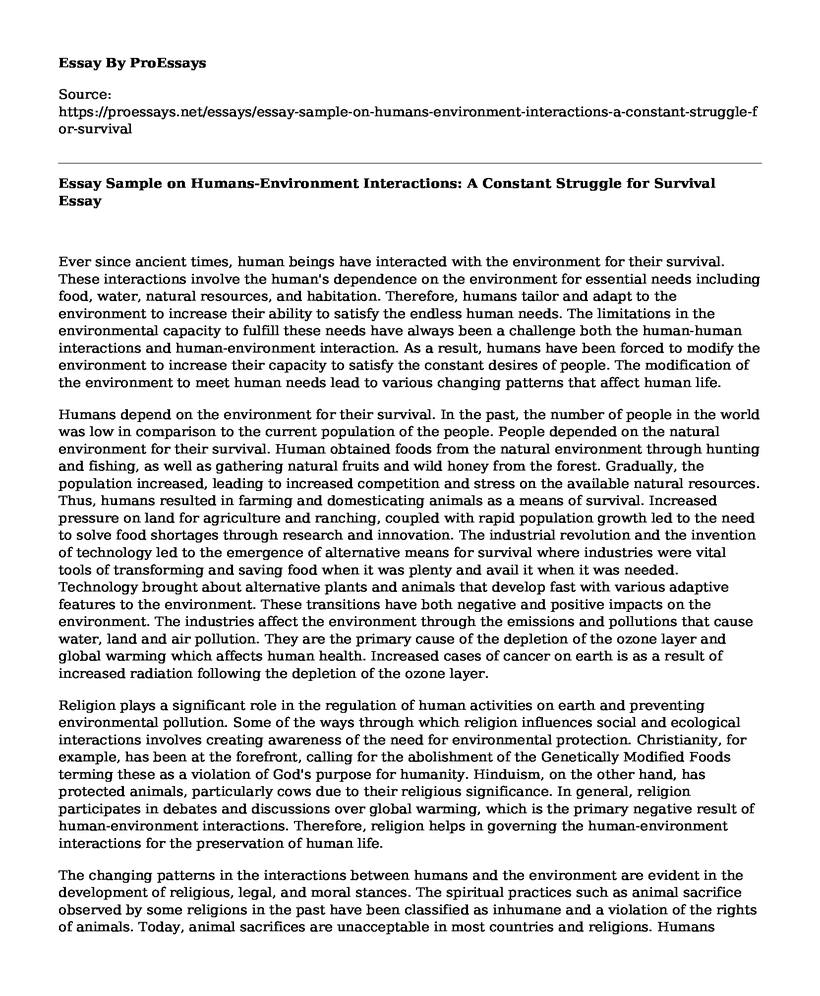Ever since ancient times, human beings have interacted with the environment for their survival. These interactions involve the human's dependence on the environment for essential needs including food, water, natural resources, and habitation. Therefore, humans tailor and adapt to the environment to increase their ability to satisfy the endless human needs. The limitations in the environmental capacity to fulfill these needs have always been a challenge both the human-human interactions and human-environment interaction. As a result, humans have been forced to modify the environment to increase their capacity to satisfy the constant desires of people. The modification of the environment to meet human needs lead to various changing patterns that affect human life.
Humans depend on the environment for their survival. In the past, the number of people in the world was low in comparison to the current population of the people. People depended on the natural environment for their survival. Human obtained foods from the natural environment through hunting and fishing, as well as gathering natural fruits and wild honey from the forest. Gradually, the population increased, leading to increased competition and stress on the available natural resources. Thus, humans resulted in farming and domesticating animals as a means of survival. Increased pressure on land for agriculture and ranching, coupled with rapid population growth led to the need to solve food shortages through research and innovation. The industrial revolution and the invention of technology led to the emergence of alternative means for survival where industries were vital tools of transforming and saving food when it was plenty and avail it when it was needed. Technology brought about alternative plants and animals that develop fast with various adaptive features to the environment. These transitions have both negative and positive impacts on the environment. The industries affect the environment through the emissions and pollutions that cause water, land and air pollution. They are the primary cause of the depletion of the ozone layer and global warming which affects human health. Increased cases of cancer on earth is as a result of increased radiation following the depletion of the ozone layer.
Religion plays a significant role in the regulation of human activities on earth and preventing environmental pollution. Some of the ways through which religion influences social and ecological interactions involves creating awareness of the need for environmental protection. Christianity, for example, has been at the forefront, calling for the abolishment of the Genetically Modified Foods terming these as a violation of God's purpose for humanity. Hinduism, on the other hand, has protected animals, particularly cows due to their religious significance. In general, religion participates in debates and discussions over global warming, which is the primary negative result of human-environment interactions. Therefore, religion helps in governing the human-environment interactions for the preservation of human life.
The changing patterns in the interactions between humans and the environment are evident in the development of religious, legal, and moral stances. The spiritual practices such as animal sacrifice observed by some religions in the past have been classified as inhumane and a violation of the rights of animals. Today, animal sacrifices are unacceptable in most countries and religions. Humans protect animals more today as opposed to the past. In addition to animal rituals, hunting of wild animals is a violation of state laws. Thus, animal sacrifice traditions and poaching are morally wrong and unacceptable. The legal framework and moral stands govern numerous industrial performances. Regional bodies such as the United Nations Environment Programme (UNEP) term global warming as a moral issue. It calls for industries to take initiatives that protect the environment by regulating industrial emissions that deplete the atmosphere. The regulation of these emissions is the initial step in the control of global warming and its associated effects on humans. Therefore, global warming is a moral issue that calls for personal initiatives with the aim of environmental pollution.
Cite this page
Essay Sample on Humans-Environment Interactions: A Constant Struggle for Survival. (2023, Apr 28). Retrieved from https://proessays.net/essays/essay-sample-on-humans-environment-interactions-a-constant-struggle-for-survival
If you are the original author of this essay and no longer wish to have it published on the ProEssays website, please click below to request its removal:
- Safety of Genetically Engineered Food Crops - Research Paper
- Essay Sample on Biomes: Temperate Forests & Tropical Rainforests
- GMOs: Benefits and Risks in Feeding a Growing Population - Essay Sample
- Essay on the Interconnectedness of Animal Diseases: An Analysis of Quammen's Spillover
- Essay Example on ESA Endangered Species Protection: 1600 Species Saved and Growing
- Essay Example on Facial Muscles: Anatomy, Positions & Effects
- Four Main Tissues - Essay Sample







